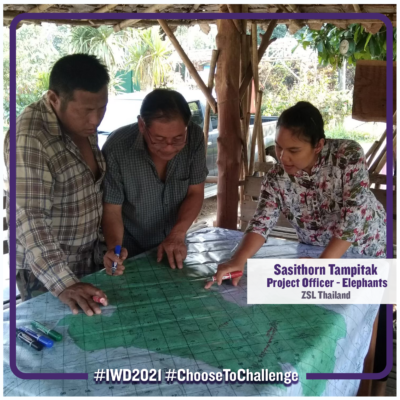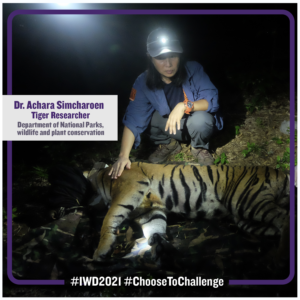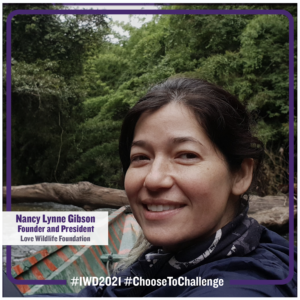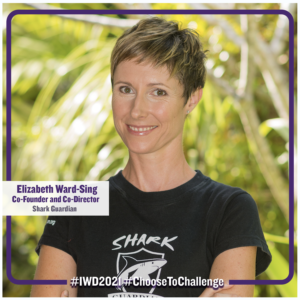
This International Women’s Day and throughout March, WildAid is shining a spotlight on some of the incredible women in conservation who are working tirelessly to protect wildlife.
Sasithorn (Gib) Tampitak is a project officer for ZSL Thailand’s elephant project that works to mitigate human-elephant conflict.
ZSL is working to monitor and mitigate conflict between humans and elephants around the boundaries of the protected area complex in southeastern WEFCOM, including Salakpra Wildlife Sanctuary, Kheuan Srinakarin National Park and Chaloem Ratanakosin National Park.Approximately 200 Asian elephants live in this landscape, where historically, elephants and humans have coexisted with little conflict. However, within the last 20 years, incidents of conflict such as crop raiding, property damage and in extreme circumstances elephant/human deaths have increased.
“I love elephants because they keep they complete the forest’s ecosystem. Elephants make our forests grow free of charge and even make food and water available to the smaller animals. Without elephants there would be no forests and without forest’s there would be no water to farm our land and sustain our livelihoods.” said Sasithorn.
Sasithorn is one of the key person under ZSL’s elephant program who works collects data and works closely with community groups and protected area managers to mitigate the effects of crop raiding.
“The community members are always asking questions about solutions to the damages caused by elephants raiding their crops. First, we have to build trust with them and then introduce different mitigation techniques. We also bring them to other communities facing similar problems for sharing lessons learned and finding a sustainable solution. We cannot separate people from forests but we can learn to co-exist with nature. Everyone needs to play a part because the benefits or even the damage would be suffered by all.” Added Sasithorn.


Dr. Achara Simcharoen is a scientist and a researcher under Western Forest Tiger Ecology Study project under Thailand’s Department of Nationals Parks, Wildlife and Plant conservation. She has been studying and researching Tiger’s ecology for over 25 years, around the same time Thailand began its research in Tigers. It was in year 2005 that Thailand began putting GPS collars on Tigers which helped researchers accurately collect data on Tigers movements and behaviors. Today, the collected data is used to help conservation of tigers and many other species. Till date, Dr. Achara has collared over 30 tigers.
“The challenge of researching tigers is making the Thai public see the value and importance of conservation Tigers in our forests. There was a recent case last month where a tiger named “Thanakorn” got out from the forest and caused some damage to community members in Uthaithani province. We were able to catch it and return to the forest. But, it showed us that we still need to build understanding with the public as incidents like this can cause people to look at tigers negatively. We need to treat it as an isolated incident. Thailand’s tiger population is not large enough for cases like Thanakorn to occur frequently. I will continue to do my role as a researcher and help communicate to create understanding about Tigers and importance of tiger conservation among the Thai public.” Said Dr. Achara.
Currently the tiger researchers are studying behaviors in adolescence tigers because there is insufficient data on their movements and territories. The data collected will help fill in the gap in the tiger conservation plan and will also protected areas in the surrounding area with their conservation direction
“All humans can have a role in protect wildlife simply by reflecting and remembering that a healthy forest equals healthy livelihoods.” added Dr. Achara.


Maria Poonlertlarp is the co-founder and director of SOS Earth, a non-profit organization that works to educate and co-create campaigns enabling a clear positive impact on the environment. Maria is also a former Miss Universe Thailand 2017.
Growing up in Asia, completing her studies in Europe, and having family in The United States Maria was learnt about different cultures from a young age. After starting to focus more on humanitarian work, she quickly came to realise how much we all depend on our environment – no matter what culture or community we come from. Finally in 2019, after spending 27 years on our beautiful planet Earth, Maria decided that she wanted to dedicate her time to ensuring all living beings would have a clean and safe environment to depend on. This meant, there was a lot of work to be done!
“The reason I have turned to environmental conservation through creative activism is because I believe we are in a very crucial turning point in time – where we can continue to destroy everything we’ve come to know or we can work together to create a habitable space for all living beings.” Said Maria. “Look at our situation now, wearing masks for pollution and covid, how we need to stay indoors with air-con in our offices, how the animals (that we exploit for our food or products) are treated. Imagine a world where we could drink and swim from our canals, breathe fresh air with no pollutants or pandemics, eat berries from the bushes on the way to school, and where birds are allowed to fly free and we can experience majestic animals in their natural habitat. Isn’t that a world you’d want to live in? We just need to clean up our act.”
Talking to us about some of the challenges working on environmental issues Maria shared that changing habits or what we do in our everyday life is the hardest thing which involves creating a mutual understanding amongst the general public on what we need to change in our daily lives to ensure a habitable future for our families. For example, knowing that our food system is responsible for ~30% of our greenhouse gases, deforestation and biodiversity loss amongst other things – Will people want to change just simply knowing this? Or perhaps they need to truly understand the cost of inaction? Or is it a system’s change that we need? Maria believes it is all of the above and that’s why it is a true challenge!
“We are all part of the problem and also all part of the solution. We need to be conscious about our every action but, to worry about it from the moment we wake up I believe means we need to push for a systemic change. We should be able to create options that allow us to live a sustainable lifestyle, with some ease.” added Maria.


Nancy Lynne Gibson is the founder and president of Love Wildlife Foundation, a Thai non-profit organization that is dedicated to the protection of wildlife through several conservation programs, involving research, education, and rehabilitation, for the well-being of animals.
Nancy was born and raised in the U.S. and has always been proud of her Thai heritage. In her role as Founder and President of Love Wildlife Foundation and former Executive Director of the Bird Conservation Society of Thailand (BCST), she has been involved in many great projects and works with inspiring people throughout Southeast Asia to make a change for the environment. She chose to work towards conserving wildlife and teaching people about its importance. Every day, she advocates to end the illegal pet trade and conserve our natural resources.
When asked about Nancy’s take on being a woman working in the conservation sector she stated “Being a woman in conservation people often stick you in a stereotype, expecting a girl dressed in rugged clothes, looking like I’m going hiking or perhaps a super emotional hippie tree-hugger. Not that anything is wrong with that. I like to dress to impress, do my hair and wear dark red lipstick when joining public functions and meetings. Don’t get me wrong, I still love my blue jeans, t-shirt and flip-flops.”
“I think that being confident in who I am and embracing the things I like as a woman draws attention and allows me to interact with the people I need to engage to get things done. Some might say that it is sad that a girl must do this to demand attention in a society or a male-centric profession, but I think of it as an advantage. I do it because I like it, not because I have to. A woman has the ability to charm and to attract attention when needed. Being confident, but not overbearing, charming but not too flirty, sweet but not cheesy, empathetic but not emotional, are my work tools. Being a woman has helped me to get things done and I’m proud to say I am who am I am today.”
Nancy also shared there are plenty of challenges working in this field that is hard to pinpoint without writing a book. But, she tries to remember the positive things that were achieved. An inspired individual, an animal saved, an enclosure built, friendships created and programs started. She believes that by teaching people to love and appreciate nature, we can build a generation of environmentally conscious individuals.
“You don’t have to become a biologist, activist or conservationist to protect biodiversity. Everyone can do their part by being aware of how important biodiversity is to our society. In knowing this, one can make conscious decisions in one’s everyday life in saving our planet. Every little bit counts, so please do your part, however minor you may think it be.” added Nancy.


Elizabeth Ward-Sing is the co-founder and co-director of Shark Guardian, a charity that works to advance the conservation of shark species worldwide for their sustainable management and to protect the natural environment. Shark Guardian does this through education, conservation, research and expeditions.
A physiotherapist by trade, Elizabeth travelled the world in 2007, fell in love with scuba diving and Thailand. She became a dive professional in 2009 and saw there was a lot of work to be done to educate people about the decline in marine species and habitats, which she was witnessing under water. With her husband Brendon, Shark Guardian evolved in 2013, to share what they had discovered as well as to inspire others, especially children and the next generation, to get involved to protect our sharks and our oceans.
“For any females coming in to this field I would advise to find a good female mentor so you can be guided through tricky situations. And. of course always listen to your gut feelings regarding what should and should not be expected of you,” said Elizabeth “We are using Shark Guardian as a platform to highlight some of the inequalities – differing pay scales or expecting to work for free seems a common issue. I’m positive that things are changing and there is going to be more equality throughout this field – there are amazing female scientists and researchers and I feel proud that we have a platform where we can collaborate and share such wonderful work as it happens.”
Talking about some of the challenges shark guardian faced Elizabeth mentioned that the main challenges comes from lack of funding, It is a lot of time and effort with limited manpower and resources to make things happen. But, the drive continues due to the response from the people they educate for e.g. children getting their parents to stop eating shark fin soup or the recent Finspire Change Campaign in the UK which is going to result in legislation change.
“We were all put on this planet for a reason and if conservation is your calling, whatever path may lead you there then there’s a way to make that calling work, for the sake of saving our planet. Even small changes can make such a difference.”
You can share important facts and information from Shark Guardians communication channels, invite them to your schools even contribute to research with the citizen science project. Through E-Oceans application everyone can contribute real time data to what you are seeing and this allows organizations like shark Guardian to see what is missing too, for e.g. declining shark species. You can even report the trash and fishing activity that you see. And, a simple step everyone can take is say no to ALL shark related products.
Help raise support for women in conservation. Join the “Let’s all choose to challenge” movement on social media. Strike the #ChooseToChallenge pose with your one hand high to show your commitment to choose to challenge inequality, call out bias, question stereotypes and help forge an inclusive world. Then tag other women supporting/working in conservation in your post.
Stay in touch and get the latest WildAid updates.
SIGN UP